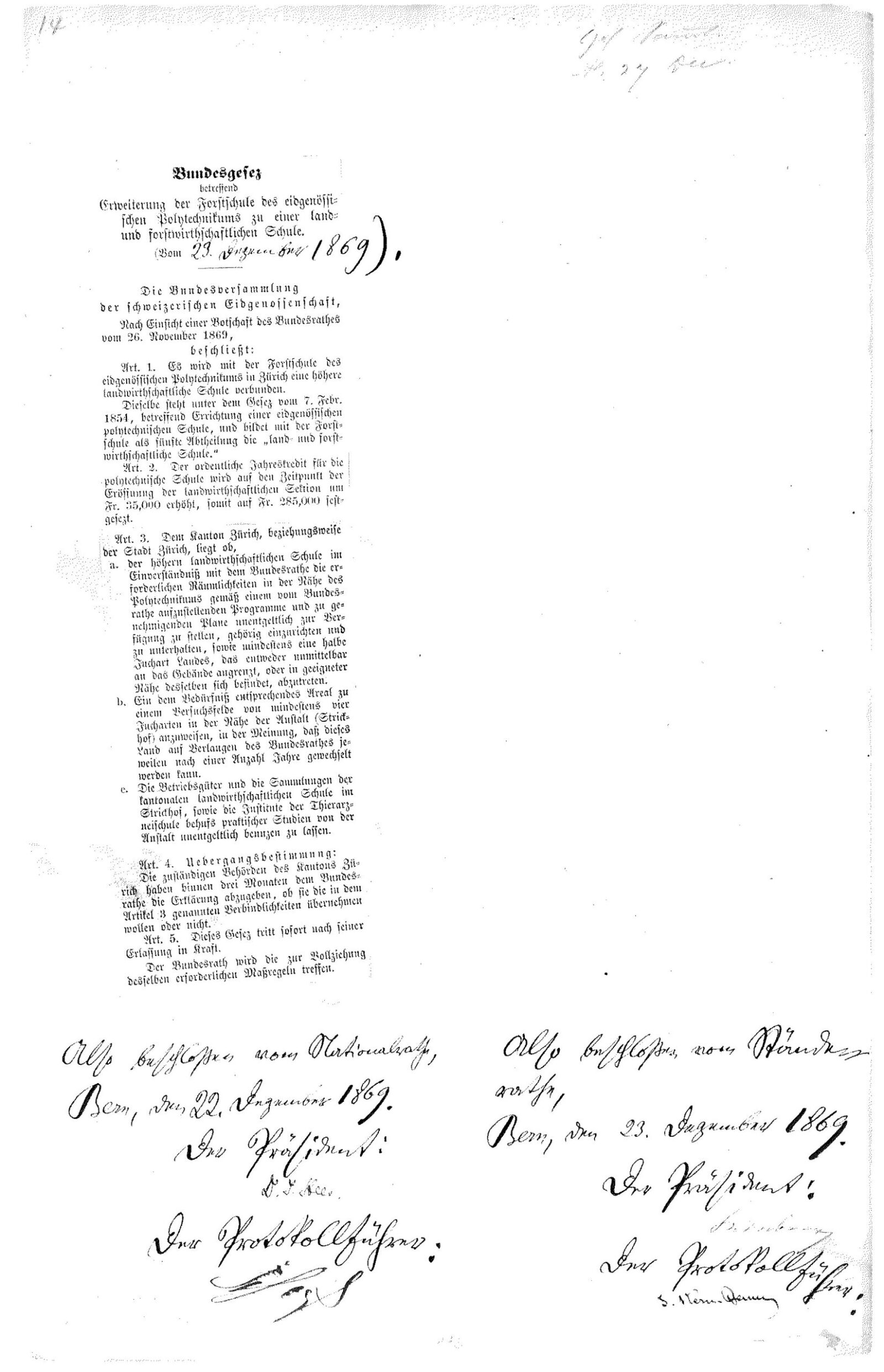How it all began in 1871
The foundation of agricultural sciences
The call for a "Landwirtschaftliche Schule" dates back to the time shortly after the foundation of the Polytechnic. After lengthy negotiations, the Federal Council and Parliament decided to put the project into action in 1869. Two years later, the first five students were able to begin their agricultural studies.
In the middle of the 19th century, the pressure on agriculture increased. Switzerland's degree of self-sufficiency was declining, even though around 50 % of the population worked directly or indirectly in agriculture. The ongoing industrialisation also played a role. Domestic production declined, while more and more cheaper grain was imported.
The founders of the "Landwirtschaftliche Schule" were aware that agriculture was closely linked to the political and economic development of Switzerland. They therefore demanded the best conditions for agriculture so that it could be secured, promoted and further developed.
Good times for science
Along with the industrial revolution, the sciences also made great progress. Building on the findings of the previous century, the individual research fields became increasingly structured and professionalised. The rapid changes in society encouraged the systematic study of observations and experiences.
While abroad, especially in Germany, agronomy had a firm place in science, Switzerland still had some catching up to do. The focus of agricultural education at that time was still mainly on teaching and cataloging empirical values.
With the new study programme at the Polytechnic, the focus was deliberately put on a broader understanding of the "system of agriculture". Due to the economic-political situation of the time, the interactions between agriculture and farming efficiency were to be studied and understood in greater detail. The declared aim was "to educate prospective farmers about the connections between agricultural production" and "to gain knowledge of the importance of agriculture in public life," according to a report on the foundation.
Tough negotiations
In 1864, the Assembly of Deputies of the Swiss Agricultural Society approached the federal authorities with a request to expand the forestry division of the Polytechnic into an agricultural and forestry division. Two professors and an assistant were to be appointed for this purpose, and an agricultural chemistry research station was to be created. Years of discussions followed. A special commission appointed by the Federal Council finally came to the conclusion that an agricultural division would fit well at the Polytechnic. Moreover, the financial means and the necessary infrastructure were available there.
There was, however, one amendment: the special commission was of the opinion that one assistant was not enough to teach agricultural chemistry and that a third professorship was needed instead. Thus Ernst Schulze also came to the Polytechnic as a full professor for agricultural chemistry and agricultural technology with a slight delay, namely one year after the foundation of the foundation of the new study programme.
Finally, the time had come. In November 1869, the Federal Council submitted a resolution to Parliament which, before Christmas of the same year, approved the "Bundesgesez betreffend Erweiterung der Forstschule des eidgenössischen Polytechnikums zu einer land- und forstwirthschaftlichen Schule".

12% of the budget for 3 professors
The first three professors for the newly formed study programme - Adolf Kraemer, Anton Nowacki and Ernst Schulze - covered the areas of farm management and animal production, plant production and arable farming, as well as agricultural chemistry and agricultural technology. In 1871, the first five students began their studies – all five of them were men. The first four students who eventually graduated were Joseph Frey from the canton of Aargau, Tommaso Galanti and Pietro Masetti from Italy, and Gilbrecht von Löw from Hessen in Germany. Interestingly, the first three professors were also foreigners. In his speech on the occasion of the 125th anniversary of the Agricultural Sciences study programme, the ETH President at the time, Jakob Nüesch, took this fact as an indication that agricultural sciences were not as conservative as their reputation. The "Landwirtschaftliche Schule" was awarded 12% of the Polytechnic's budget at the time. At the same time, the school's overall annual credit was increased by 35,000 CHF to 285,000 CHF.
In 1875, the curriculum, which was initially only two years long, was replaced by a five-semester programme, and in 1912 (according to other sources as early as 1905) by a six-semester programme. The subjects taught developed rapidly. The number of students also increased in the following years. While between 1871 and 1875 only 37 people were enrolled in the programme, the number increased to 242 between 1916 and 1920. From 1908 onwards it was also possible to be awarded a doctorate at ETH.